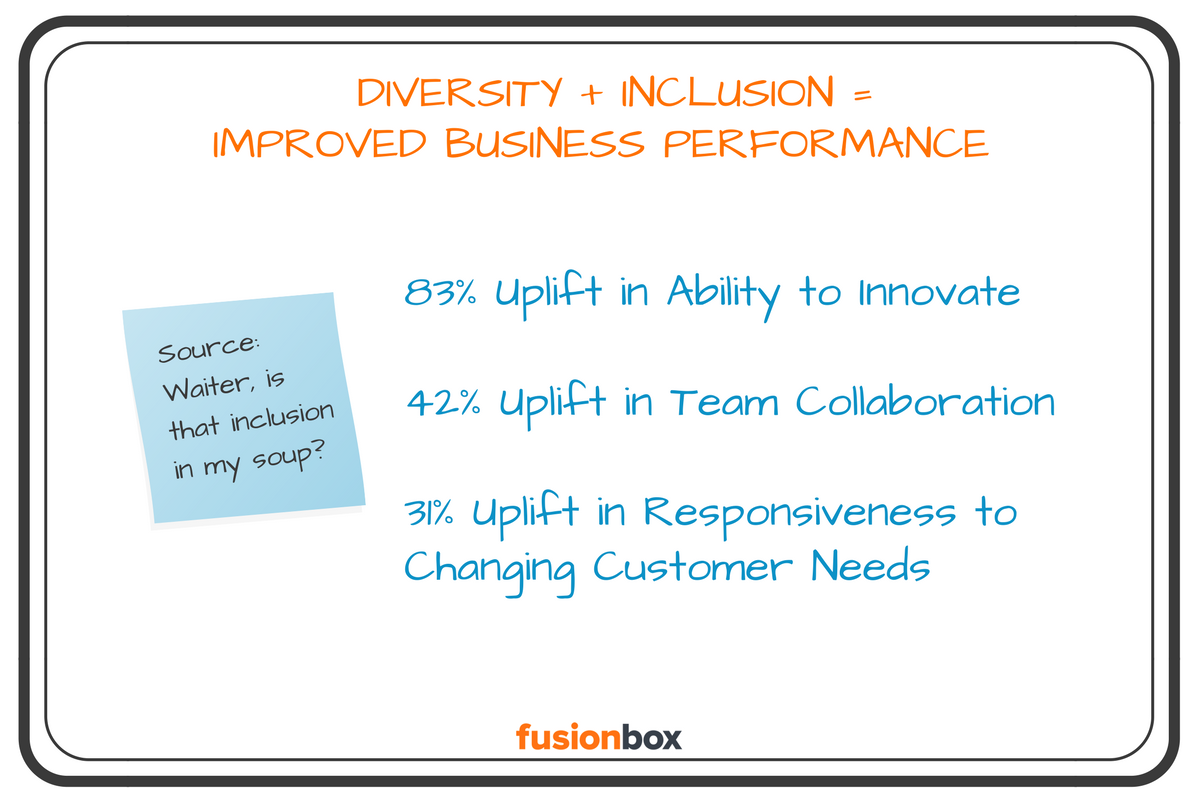This summer, I was fortunate to attend the PMI Women in Project Management Leadership Conference. The keynote and panel speakers spoke on a variety of relevant topics, but there was a common theme present: facilitating innovation. The conference provided some valuable insights on how we as project managers can act as effective facilitators to get the most from our teams, and we started by asking the question: Where do good ideas come from?
Diversity & Inclusion
Keynote speaker Beatrice Opoku-Asare likened our diversity to superpowers and emphasized that we are most powerful when every superpower is combined. Each unique skill or background brings a valuable perspective to the project, and the statistics back up the value of those perspectives. She discussed the findings of a 2013 study by Deloitte titled: Waiter, is that inclusion in my soup?

As project managers, our responsibility is not only advocating for creating diverse teams, but ensuring that everyone on the team has continued opportunities to contribute. Even with a diverse team, if a single person dominates every meeting, you’re not utilizing every available “superpower.” The study above found that when diverse voices get equal time, employees are 3.5 times more likely to contribute to full innovative potential, and leveraging both diversity and inclusion doubles engagement on your team.
This particular keynote ended with some helpful advice on facilitating an inclusive, innovative environment.
-
Find similarity/common ground with your team. We were challenged to take 3 minutes to find something that everyone at our table had in common.
-
Everyone has had some experience as both the majority and minority in their life — draw on these experiences, and you can connect to anyone.
-
Send agendas early - give the team time to think beforehand so everyone can come to the meeting with something to say.
We were also challenged to ask each other: “What’s your superpower?” Not only does this question force us to recognize our own value, but it asks us to recognize what isn’t our superpower, and who else might be able to contribute that skill.
Confidence
During the conference’s panel discussion, the question of establishing credibility was raised. Particularly for project managers on a new team, how can you minimize the friction of working with someone new? As facilitators, we’re responsible for removing obstacles, including any uncertainty within the team, whether that’s directed at each other or at us.
We can encourage confidence in individuals by demonstrating it. One way to do so is delegation. Delegating responsibilities to team members is a tangible display of confidence and it empowers your team by giving them opportunities to achieve goals and grow professionally, increasing both their own self-confidence and the team’s confidence in them.
In terms of building the teams confidence in yourself as a project manager, the following advice was given:
-
Acknowledge that you are not the expert. Defer to the expertise of your teammates when appropriate.
-
Set specific, achievable goals, and follow through on them.
-
Adapt your management style to the individuals on the team rather than strictly adhering to processes that only work for you.
Work-Life Blend
When 50% of available hours in a given week are dedicated to work and sleep, it’s hard to call that balance, but promoting a healthy work-life blend for your team (and yourself!) can make all the difference in facilitating an innovative environment.
In our constantly-connected environment, it’s important to respect the work-life balance of your coworkers. If you’re sending after-hours communications, ensure that the expectation of both parties is understood. If you’re constantly bombarding someone with late-night emails and they believe they are expected to be available and responsive after they leave the office, this can place an undue strain on their personal time and lead to decreased performance in the long run, even if you don’t expect a response from them.
Similarly, be sure to set your own boundaries around work. Keynote speaker Ashley Rene Casey reminded us: “You own your time.” It’s okay to say no to things, and we shouldn’t be guilted into spending our time in a way that’s detrimental to our well-being.
She illustrated her message by giving us Play-Doh and asking us to divide it up based on how we spend our time. She noted that we often spend most of our time where we think our priority should be, but that can lead to an unhealthy work-life blend. Here are her suggestions for prioritizing our time:
-
Health: Most of your time should be spent on activities that improve your physical/mental/spiritual well-being.
-
Stealth: After health, you should allocate time to nurturing the important relationships in your life.
-
Wealth: Finally, work should not have to take most of your time.
We were challenged to think about our Play-Doh and how we could say no or delegate to take back some of our time and create a healthier work-life blend. It was also re-emphasized that when we try to do everything ourselves, we become burnt out and a bottleneck that prevents team growth. When we are conscious of work-life blend in our own lives, we are more likely to encourage it on our teams, and encourage well-rounded growth.
In Summary:
Project Managers can have a significant influence on facilitating innovation, and it's important that we both understand the responsibility and embrace the opportunity to do so. Ultimately, when everyone on the team feels that their time is valued and respected, they can come back to the office refreshed and ready to innovate.
Fusionbox is a Denver Python & Django development company, with a focus on secure, well-architected projects. Contact us today to discuss your project.
